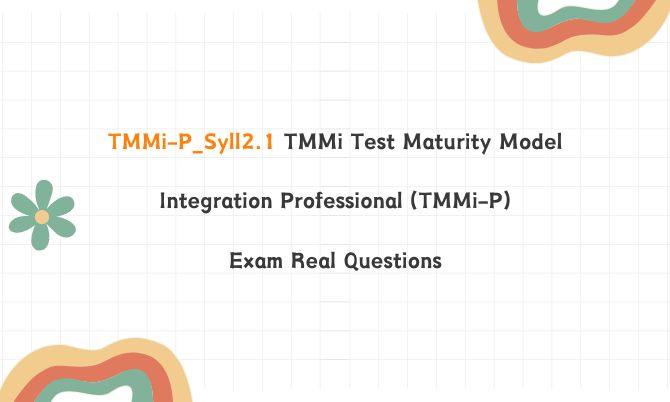The TMMi Test Maturity Model Integration Professional (TMMi-P) certification is designed for professionals in the software testing field who wish to validate their expertise in test management and process improvement. This certification focuses on the TMMi framework, a structured model for improving and assessing the maturity of software testing processes within an organization. By achieving this certification, professionals demonstrate their deep understanding of the TMMi model and their ability to drive improvements in test management practices.

The TMMi-P certification is suited to anyone involved in or interested in improving software testing processes, particularly:
●Software testers and test managers who aim to enhance their understanding of test management improvement.
●Test process improvers and consultants looking to guide organizations in the implementation of TMMi.
●TMMi assessors or lead assessors responsible for evaluating test maturity levels.
●Business stakeholders involved in software quality assurance initiatives.
●Members of test process groups working on refining testing activities.
To become a certified TMMi Test Maturity Model Integration Professional, candidates must pass the TMMi-P exam. The certification can be pursued by either attending a training course or through self-study, and the exam is offered through Pearson Vue.
The TMMi-P certification TMMi-P_Syll2.1 exam consists of 40 multiple-choice questions. Candidates are given 60 minutes to complete the TMMi-P_Syll2.1 exam if it is taken in their native language. For non-native speakers, the time allowed is extended to 75 minutes. Each question carries one point, and a minimum score of 65% (26 correct answers) is required to pass the exam.
The recommended way to prepare for the exam is by attending a course offered by a registered TMMi training provider. These courses cover essential content such as:
●The basics of test process improvement.
●The structure of the TMMi model.
●How to assess and implement TMMi within an organization.
For self-learners, the TMMi-P syllabus offers a structured guide to the topics that will be covered in the exam, enabling candidates to study independently and take the exam directly through Pearson Vue.
Besides, Testpassport provides the latest TMMi-P_Syll2.1 real exam questions, which can help you study all the related topics. Share some TMMi-P_Syll2.1 real exam questions below.
1.The three TMMi level 5 process areas. Defect Prevention, Quality Control and Test Process Optimization, all provide support for continuous process improvement. Which of the following statements on the relationship between these process areas is correct?
A. Quality Control supports Defect Prevention by implementing test improvement proposals
B. Quality Control supports Defect Prevention by evaluating new testing technologies and determining their impact on the testing process.
C. Test Process Optimization supports Quality Control by analysing outliers to process performance and by implementing practices to prevent defect re-occurrence.
D. Defect Prevention supports Test Process Optimization by submitting test improvement proposals
Answer: D
2.An organization is trying to achieve TMMi level 4 compliance. Which of the following process areas is NOT in the scope of the test improvement program
A. Product Quality Evaluation
B. Test Process Optimization
C. Advanced Reviews
D. Test Lifecycle and Integration
Answer: D
3.To which TMMi level 4 process area does the specific practice "Define a co approach is defined that co-ordinates both static and dynamic testing?
A. Product Quality Evaluation
B. Test Measurement
C. Advanced Reviews
D. This is not a specific practice of a TMMi level 4 process area
Answer: C
4.Which of the following is a specific goal of the process area Advanced Reviews?
A. Measure Product Quality Early in the Lifecycle by Means of Peer Reviews
B. Establish a Peer Review Approach
C. Peer Review Activities are Planned
D. Defects in Software Work Products are Identified and Removed
Answer: A
5.Consider the following specific goal "Coordinate the Peer Review Approach with the Dynamic Test Approach". To which of the following process areas does this specific goal belong?
A. Test Planning
B. Test Life Cycle and Integration
C. Peer Reviews
D. Advanced Reviews
Answer: D
Achieving the TMMi-P certification brings several career benefits:
International Recognition: The certification is globally acknowledged, making it a valuable credential for professionals seeking to demonstrate their knowledge of test process improvements.
Test Management Leadership: Certified professionals will be able to explain the importance of improving test management processes to organizational leaders and guide teams through process improvement initiatives using the TMMi model.
Advisory Role: TMMi-P certified individuals can take on advisory roles, helping organizations interpret the TMMi framework and recommending its adoption for continuous test process improvement.
Contributing to Test Process Improvement: Certified individuals will have the qualifications to participate in, or even lead, test process improvement programs within their organizations or projects.
The TMMi-P_Syll2.1 TMMi Test Maturity Model Integration Professional (TMMi-P) certification offers software testing professionals a structured path to improving test management and advancing their careers. By becoming certified, professionals not only validate their expertise in the TMMi model but also position themselves as leaders in test process improvement within their organizations. With the growing importance of quality software, earning the TMMi-P certification helps professionals stand out and drive significant improvements in software development projects.